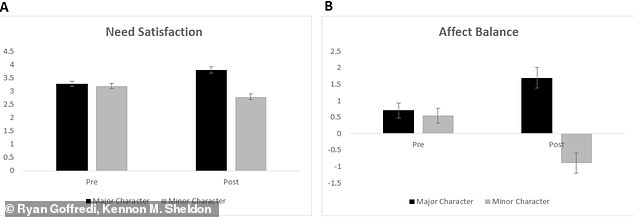Do You Have Main Character Syndrome? People Who Believe They Are The Protagonist In Their Life Are Happier Than Those Who See Themselves As Sidekicks, Research Finds
If you find yourself dancing in the rain or standing on the front deck of a cruise ship, you may be suffering from “protagonist syndrome.”
Scientists now claim that living your life as if you were the main character could be good for your mental health.
Researchers at the University of Missouri found that people who see themselves as the main character rather than the supporting character have higher overall well-being.
In their article, the researchers write: ‘Such individuals feel more autonomous, competent, and effective, and also experience greater relational satisfaction with others.’
In fact, even telling a story in which you are the main character is enough to increase your sense of psychological satisfaction.
Researchers claim that people who feel more like the ‘main character’ in their lives have higher levels of satisfaction (stock image)

The study found that feeling like you’re the main character in the movie of your life was linked to greater feelings of psychological satisfaction
In psychology, the term “narrative identity” refers to the way we view our own role in the story of our lives.
As the researchers point out, traditionally it has always been assumed that people saw themselves as the main character of the story.
However, it is also possible that people see themselves as playing only a small role in a larger story, or as playing only a supporting role in someone else’s story.
The researchers designed three experiments to measure the impact of narrative identity on the satisfaction of basic psychological needs.
In the first study, 385 university bachelor students completed a questionnaire in which they had to indicate how they felt as a main character.
On a scale of one to five, they were asked whether they were a “supporting character” or a “main character,” a “minor character” or a “main character,” and a “background character” or a “main character.”

The researchers found that recalling a time when you felt like the main character (black bar) increased positive feelings such as satisfaction and well-being. Remembering a time when you felt like a supporting character (gray bar) actually decreased these measures.
This test found that participants who saw themselves as an important character experienced significantly higher levels of need satisfaction and well-being.
Interestingly, higher levels of ‘important character perception’ were also an indicator of better well-being over four weeks, suggesting that this was a long-term, significant marker of psychological satisfaction.
In their article, published in Journal of Personality Researchthe researchers write: ‘In contrast, people who see themselves as secondary characters are more likely to feel hindered in satisfying these needs, a condition that is associated with reduced self-integration and well-being.’
In a second experiment, 326 college students were asked to complete a survey assessing their well-being twice: before and after recalling a story in which they were a main or secondary character.

Our level of ‘important character perception’ could be a strong indicator of mental well-being, according to this study (stock image)
The researchers found that there was a significant difference in the results of the pre- and post-surveys depending on the type of story told.
People who told stories in which they were the main character experienced significant increases in well-being and need satisfaction after recalling the story.
In contrast, those who could recall times when they felt like a less important character showed significant declines in these areas.
In a third experiment, 298 participants were asked to describe three goals they were pursuing and to rate their motivation for doing so.
Participants then repeated the main character and well-being questionnaires, after which they wrote a story describing themselves as the main character in their lives.
Research by the experts found that people with higher perceptions of their main character pursued goals that connected meaningfully with their values and showed higher levels of self-motivation.

Films like Eternal Sunshine Of the Spotless Mind (pictured) set the standard for ‘lead character’ acting, with many on social media associating the term with gestures of independence and assertiveness.
Analysis of the written stories also showed that people with a protagonist complex felt more control over the world and their actions, also known as ‘agency’.
The idea that people can gain more influence by becoming the “main character” is something that has long been widespread on social media.
On TikTok, some people describe what they call the “main character” method, where they interpret all the events in their lives as moments in an ongoing TV series, like “Sex and the City.”
In a video, a TikTok user says, “I started living my life in such a way that every day was part of the story.
‘When you live your life like it’s a season, like a show, and everything that goes wrong, your mindset changes completely. You’re like, “Oh, sure, this is just for the plot.”‘

On TikTok, some say they try to live their lives as if they were the main character in a show like Sex and the City (pictured). The researchers suggest that people who experience their lives this way may be more satisfied
Since 2019, the phrase “romanticize your life” has become a common call for people to act more like the protagonist of their own personal TV show.
While these ideas may not always have scientific support, they do reflect the researchers’ core finding that perceptions of important characters are associated with greater autonomy.
The researchers don’t say whether there’s anything you can do to improve your sense of protagonist.
However, they do note that “the way an individual sees himself or herself as a character in his or her life story is likely to influence his or her well-being.”
The researchers write: “When people see themselves as the driving force in their own lives and make their own decisions, as protagonists do, rather than being swept along by external forces (and other people), they are more integrated and fully functioning.”
